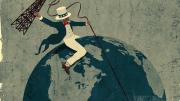By most measures, the Trump administration’s first year in office has been turbulent, but Meghan O’Sullivan, Kirkpatrick professor of the practice of international affairs at the Kennedy School, says the United States nevertheless occupies a unique position of potential global strength. The former deputy national security adviser for Iraq and Afghanistan under President George W. Bush says that America’s dependence on foreign oil has been a dangerous strategic vulnerability since the Nixon administration. But the situation has changed, she argues in her new book, Windfall: How the New Energy Abundance Upends Global Politics and Strengthens America’s Power. If the United States succeeds in “harnessing” today’s energy boom instead of foolishly adopting isolationist policies in pursuit of total energy independence, it has the chance to elevate its leadership position around the world, forge new international partnerships, and above all, further its economic and political interests.
The current boom is largely caused by extraction technologies that make it easier and cheaper to produce natural gas and oil, as well as new technology for liquefying natural gas cheaply. (Because natural gas is much less expensive to transport when liquefied, this once local commodity has now reached the vast global energy marketplace.) One of those evolving extraction technologies is fracking. O’Sullivan admits the method is environmentally fraught, but says, “I think our country is trying to find the right balance between being responsible toward the environment while still reaping the economic and strategic benefits that come with being one of the world’s largest producers of oil and natural gas.”
She advocates a “Goldilocks solution” to fracking—one that does not involve so many regulations as to make production unattractive, but that does have sufficient regulations to mitigate the most serious environmental concerns. Decisions about whether and how to extract domestic energy supplies, she argues, should weigh not only environmental concerns, but also geopolitical relationships. “Energy is a huge benefit to the United States, and it’s not only economic, as something we feel at the pump or when paying to heat homes. We also need to factor in strategic interests.”
One of those strategic interests relates to Russia. The energy boom’s lower prices have created a huge fiscal challenge for the oil- and natural-gas-driven Russian economy. O’Sullivan connects Vladimir Putin’s increasingly aggressive foreign policy directly to that mounting challenge. “From a U.S policymaking perspective, we need to be prepared for Russia to try to compensate for these kinds of losses,” she says. “The natural-gas boom means Europe now has other options for meeting its energy needs if Russia becomes too difficult to deal with.” This means that while Russia will remain a big exporter of energy to Europe, it will struggle to politicize this trade as it has in the past. As a result, Putin has had to adhere to European Union laws and regulations that he previously had the leverage to avoid.
As for China, another key foreign-policy interest, O’Sullivan argues that the United States should capitalize on every opportunity for the two countries to work together constructively. “This new energy environment has led a lot of countries to question how committed the United States is going to be to Middle Eastern stability going forward,” she notes, and this worries the Chinese. They are increasingly dependent on external sources of energy, from the Middle East in particular, just as the United States is becoming more self-sufficient. For this reason there is “an opportunity for us to have a conversation about how to work together toward a common end: achieving greater stability in a critical part of the world.”
Although much of Windfall focuses on the potential benefits if America realizes its position of energy strength, the book is quick to warn against what O’Sullivan calls the country’s dangerous “unrequited love” for achieving total energy independence. In order to become truly independent and essentially function as an island economy, the United States would have to enforce dramatic isolationist and protectionist policies that she considers inefficient, costly, and ultimately counter to the nation’s best interest. She points to the aftermath of Hurricane Harvey as an instance when being connected to international markets was of critical importance: “When our refining capacity went down on the Gulf Coast, there were some hiccups, but pretty soon after, we just started importing from other sources. Being connected to global markets allows for us to be resilient.”
If Americans are able to look beyond their enduring obsession with energy independence and use the energy boom to further the country’s international power, she declares, the benefits could be exponentially higher.









